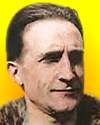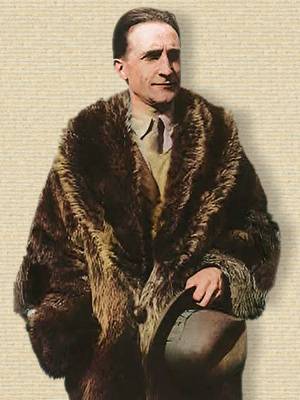 (source)
(source)
|
Marcel Duchamp
(28 Jul 1887 - 2 Oct 1968)
French painter, sculptor and writer who work included the styles of Cubism, Dada, Surrealism and conceptual art. He is also known for creating the his “readymades” from 1913, based on ordinary everyday objects, little changed, which Duchamp declared to be works of art. For example, a snow shovel he named “In Advance of the Broken Arm” (1915).
|
Science Quotes by Marcel Duchamp (3 quotes)
Marcel Duchamp: I find that the physical laws as they are, as they are taught to us, are not necessarily the truth. We believe in them or experience them every day, but I believe that it is possible to consider the existence of a universe where these laws would be extended, changed just a little, exactly limited. And therefore we immediately obtain extraordinary and different results and which are certainly not far from the truth, because, after all, every hundred years or every two hundred years a new physicist arrives who changes all the laws, does not is this not? After Newton, there are others and even there will be others after Einstein, you see, we must expect this change in the laws in question, therefore.
GV: But all your activity, I think, has tended towards this possibility beyond the immediate?
Marcel Duchamp: Surely. In any case, without being a scientist myself, one can hopefully achieve results parallel to the influence, if you will, in art. And which gives satisfactory results in any case… satisfactory, in the sense of the newness of the thing, which appears as something which has never been seen before. Something that has never been seen before.
GV: But all your activity, I think, has tended towards this possibility beyond the immediate?
Marcel Duchamp: Surely. In any case, without being a scientist myself, one can hopefully achieve results parallel to the influence, if you will, in art. And which gives satisfactory results in any case… satisfactory, in the sense of the newness of the thing, which appears as something which has never been seen before. Something that has never been seen before.
— Marcel Duchamp
The unmodified translation by Sarah Skinner Kilborne of the Guy Viau interview of Marcel Duchamp on Canadian Radio Television (17 Jul 1960) as given on the toutfait.com website of the Marcel Duchamp Studies Online Journal. GV is the interviewer, Guy Viau. This text may be compared with the modified version in an Epigraph given in James Housefield, Playing with Earth and Sky: Astronomy, Geography, and the Art of Marcel Duchamp (2016), ix.
Marcel Duchamp: Je trouve que les lois physiques telles qu’elles sont, telles qu’elles nous sont enseignées, ne sont pas forcément la vérité. Nous y croyons ou les expérimentons chaque jour, mais je crois qu’il est possible de considérer l’existence d’un univers où ces lois seraient étendues, changées un tout petit peu, exactement limitées. Et par conséquent on obtient immédiatement des résultats extraordinaires et différents et qui ne sont certainement pas loin de la vérité, parce que, Après tout, tous les cent ans ou tous les deux cents ans un nouveau physicien arrive qui change toutes les lois, n’est-ce pas? Après Newton, il y en a d’autres et même il y en aura d’autres après Einstein, n’est-ce pas, il faut s’attendre à ce changement des lois en question, donc.
G.V.: Mais toute votre activité, je pense, a tendu vers ce possible au-delà de l’immédiat?
Marcel Duchamp: Sûrement. En tout cas, sans être un scientifique moi-même, on peut avec l’espoir arriver à obtenir des résultats parallèles à l’influence, si vous voulez, dans l’art. Et qui donne des résultats satisfaisants en tout cas… satisfaisants, dans le sens du nouveau de la chose, qui apparaît comme une chose qui n’a jamais été vue avant. Du non-déjà-vu.
G.V.: Mais toute votre activité, je pense, a tendu vers ce possible au-delà de l’immédiat?
Marcel Duchamp: Sûrement. En tout cas, sans être un scientifique moi-même, on peut avec l’espoir arriver à obtenir des résultats parallèles à l’influence, si vous voulez, dans l’art. Et qui donne des résultats satisfaisants en tout cas… satisfaisants, dans le sens du nouveau de la chose, qui apparaît comme une chose qui n’a jamais été vue avant. Du non-déjà-vu.
— Marcel Duchamp
Transcript in the original French, Interview by Guy Viau of Marcel Duchamp on Canadian Radio Television (17 Jul 1960) as given on the toutfait.com website of the Marcel Duchamp Studies Online Journal, titled 'Changer De Nom, Simplement'. GV is the interviewer, Guy Viau. This text may be compared with the modified translated version in an Epigraph given in James Housefield, Playing with Earth and Sky: Astronomy, Geography, and the Art of Marcel Duchamp (2016), ix.
I believe that the laws of physics such as they are, such as they have been taught to us, are not the inevitable truth. We believe in the laws, or we experiment* with them each day, yet I believe it is possible to consider the existence of a universe in which these laws would be extended, changed a very tiny bit, in a precisely demarcated way. Consequently we immediately achieve extraordinary results, different yet certainly not far from the truth. After all, every century or two a new scientist comes along who changes the laws of physics, isn’t that so? After Newton there were many who did, and there were even more after Einstein, right? We have to wait to see how the laws in question will change over time, then… In any case, without being a scientist myself I can still hope to reach parallel results, if you will, in art.
— Marcel Duchamp
Epigraph, in James Housefield, Playing with Earth and Sky: Astronomy, Geography, and the Art of Marcel Duchamp (2016), ix. As modified by James Housefield, from Guy Viau interview of Marcel Duchamp on Canadian Radio Television (17 July 1960), 'Simply Change Your Name', translated by Sarah Skinner Kilborne in Tout-Fait: the Marcel Duchamp Studies Online Journal 2, no. 4 (2002). [*Note: Where the Housefield in the Epigraph uses the word “experiment”, the original French gives “expérimentons”, which in the unmodified translation by Sarah Skinner Kilborne is written more correctly as “experience.” —Webmaster]

 In science it often happens that scientists say, 'You know that's a really good argument; my position is mistaken,' and then they would actually change their minds and you never hear that old view from them again. They really do it. It doesn't happen as often as it should, because scientists are human and change is sometimes painful. But it happens every day. I cannot recall the last time something like that happened in politics or religion.
(1987) --
In science it often happens that scientists say, 'You know that's a really good argument; my position is mistaken,' and then they would actually change their minds and you never hear that old view from them again. They really do it. It doesn't happen as often as it should, because scientists are human and change is sometimes painful. But it happens every day. I cannot recall the last time something like that happened in politics or religion.
(1987) -- 


